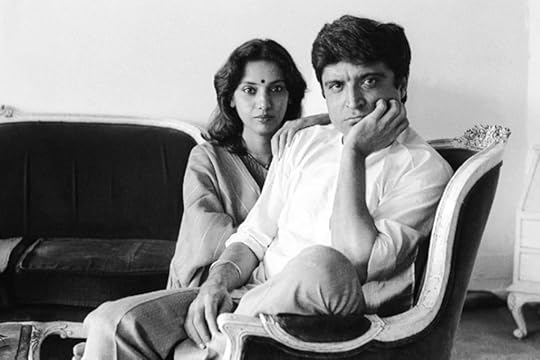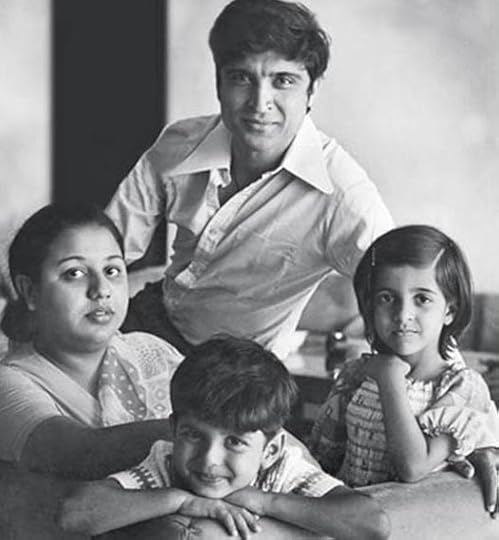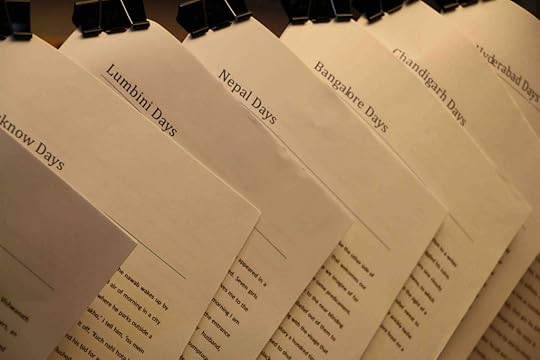Manish Gaekwad's Blog, page 12
January 26, 2019
Kavita Krishnamurthy: Married to Music
On January 25, before Republic Day, when she turned 61, the room was empty of joy.

Sharada Krishnamurthy’s mother had rejected her at birth. Her mother had refused to breastfeed the girl she had given birth to, clicking her tongue at the infant’s nutty dark skin that could impure her noble breasts full of grand plans.
T. S. Krishnamurthy, Sharada’s father, took affectionately to his newborn. He teased his wife that she wasn’t mature like the baby girl who held out one hand in her mother’s direction, seeking love.
Krishnamurthy heard music in Sharada’s baby pleas, squirming for her mother’s fuss. He had named her Sharada — after Saraswati — the goddess of music. His wife turned up her nose and ducked between the covers on her hospital bed, wishing for another child.
At home all Sharada ever heard from her mother was reproach. She attended to Sharada out of mere duty; running her to school, oiling her long plaits, teaching her how to roll dough into a perfect round shape for balloon phulkas. Sharada was constantly scolded for having no ‘gunn.’ Who would marry a girl with no skill in cooking and housekeeping?
Sharada never let her mother’s callowness affect her. She believed she was only a girl and she would someday take up after her mother’s homemaking skills by imitating. It wasn’t as tough as Rabindra Sangeet lessons, which her mother thought was a waste of the girl’s time.
When Sharada won a gold medal in a music competition at the age of eight, her father renamed her Kavita. ‘Poetry, my little girl was poetry on stage, Kavita!’ he punctuated his joy with an exclamation.
Mother snatched her medal to stow away for her marriage. Sharada, now Kavita, did not understand why her mother was so caustic. ‘If only her voice could reach heaven and please the gods to clear her skin, who will marry a dark singing swan?’ she worried at the music show, dimming Kavita’s win with her unpleasant remark.
Kavita spent all her energy in developing this one ‘gunn’ she thought would one day prove her mother wrong. At 27, when Kavita’s mother had given up on her marriage, Kavita delivered her first big solo hit number, ‘Tumse Milkar Na Jaane Kyon’ in the film Pyaar Jhukta Nahin.
At the success party of the film, in the presence of her parents, when Kavita sang to an inspired crowd, her mother, seeing the applause her dark swan was getting finally, collapsed in her seat and burst into tears.
She was uncontrollable as Kavita sang ‘Maa o-Maa, main tere dil mein hoon ke nahin hoon, tu toh meri nas nas mein basi-ee hain,’ as if musically arm-twisting her mother’s feelings for the very first time in a very public space, in a sing song voice, using a string quartet to great effect.
Just like in the film, when the child actor sings out to his anguished cine-maa.
Kavita’s mother cried, and waddled up the stage to hug her child, woeful and joking, ‘I hope you get married now.’ That remark should have vexed Kavita, but she was used to it. Mother would never grow up.
 With L Subramaniam
With L SubramaniamFame came, money flowed, but marriage was not to come, even as Kavita’s mother died many years later, wishing her daughter, who was approaching forty, would pick out ‘a retired black swan’ for herself.
Kavita had always wanted to deny her mother this right, to her marriage, as she held her ‘gunn’ of singing on a higher scale and believed, if not for this, her mother should accept her daughter’s shraddha, her marriage to music.
Two months prior to her forty-second birthday, Kavita got secretly engaged to violin maestro Dr L Subramanian who came with three grown up children from a previous marriage; a doctor, a law graduate, and one a soloist; no dark skinned child to groom.
Kavita and her husband wished to start a music institute where she could teach children not to be shy of their ‘gunn’ for music. Kavita retired from playback singing and stayed home, helping her husband collect world music for a library.
Often, standing alone in her kitchen, preparing a meal for her husband, she would break into a song, humming something she previously sang for R D Burman or the newer composers.
The house was spotless, her cooking was good, and her mother’s imprecation had prevailed.
If this was what marriage was supposed to do to you, how Kavita itched to flex her vocal chords, to rebel melodiously.
https://medium.com/media/c4769eb492cd624542d39c91179bd945/href
January 25, 2019
Javed Akhtar: Words Without Meaning
Ek Ladki Ko Dekha Toh Kaisa Laga?
 Shabana Azmi, Javed Akhtar
Shabana Azmi, Javed AkhtarThe kids, Farhan and Zoya, had been pestering their father Javed Akhtar, to take them to the Sanjay Gandhi National Park as some of the kids at school had been bragging about their visit and the magical sights they had seen.
Akhtar was having trouble writing a song he had a deadline on. The scratch of the tune had been submitted, and he was to meet the music composer and producer soon enough for a music sitting.
One Saturday afternoon, without giving his estranged wife Honey Irani any notice, he arrived at the school where his kids were and packed them in his jeep and drove off.
When Honey went to collect her kids, she was informed that her husband had taken them for an ice-cream ride.
The kids bellowed at each red light for heart shaped balloons, diced sugar cane in pouches, and roasted peanuts. They sucked on the sugar cubes and spat without a care in the world.
They yelped and badgered Akhtar with ‘Kahan jaa rahe hain papa?’ intermittently, chewing like cattle in transit. They took turns to annoy him, one would yap incessantly when the other was bored talking on the long ride to nowhere.
Once in the park, they ran around without any sense of direction. Akhtar had to shout aloud for the kids to stay close or else they would be ‘mauled by a giant, furry khargosh,’ they were told. Farhan was not to be fooled, Zoya ran back and held on to Akhtar’s pinky, obedient as Alice in wonder park.
To reward her good manners, Akhtar plucked a rose from a bush and gifted it to her. ‘Jaise khilta gulab your smile is Zo,’ he said, to make her blush. She did, obediently, and suddenly shy of her papa’s charm offensive.
He took a deep breath, lost in his thoughts, looked up at the winter sun light heating his heart with inspiring emotions and mumbled a line, ‘Jaise shayar ka khwab.’
‘Papa, dekho hiran,’ Zoya screamed excitedly when she spotted a chital in a bush overlooking Farhan, who unmindful of the rustle, was taking a leak. He jumped, fell back, and tripped on a rock. He got up slowly, a hand on his temple to block the bright noon light as Akhtar rushed to aid, ‘Ujli kiran hai beta, I know,’ he helped Farhan into the shade of a tree and dusted his clothes.
 The Akhtars
The AkhtarsFarhan requested they move in the direction of the caves, which his friends had told him was a great spot to look for screeching fruit bats. As they stood at the entrance to the largest Kanheri Cave, where the imposing basalt statue of Buddha loomed, slightly fey in mudra, Farhan asked if it was a man or a woman.
Akhtar shushed him and led the kids into the dark. He drew out a cigarette lighter from the breast pocket of his bush shirt and held up to get a good view of the Vihara prayer hall, its many columns and dome in the centre gave them a feeling that they were now in a sacrosanct area.
Akhtar felt like he was holding a ‘jalta diya’ in a temple room, emotions surging, inspiration rising in his breast, a consummate rush of words were reaching his lips to sing, a hymn in praise of the incandescent beauty that seemed to surround him at this hour.
But he still didn’t know where to start — beauty has a habit of arresting speech, it is an impediment to clarity.
Immediately after, Akhtar fell into a trance and every sight his kids shouted out was music.
Zoya chased butterflies, Farhan pelted stones at singing mynahs, the lush green carpet they traipsed on produced silken sounds to Akhtar’s ears. There was a fog of heady sandalwood scent in the thicker groves. The dancing peacocks, the gushing streams where the children gaggled, the brilliant petals of the flame of the forest — everything pulsed forward like a returning dream.
Akhtar noted, ‘Jaise khushboo liye aaye thandi hawa,’ on his way back to Honey’s house to drop the kids off. The day had breathed fresh feelings in him; it had been a rewarding break away from his writing desk. He was still in a reverie when he rang her doorbell. Honey cussed him, said not to take the kids anywhere without her permission.
‘Par mummy,’Farhan tried to interrupt. ‘Tum chup raho,’ Honey, indignant of their fun day, patted the kids into the hallway and slammed the door at a stunned Akhtar. Akhtar, who till now was entangled in a poetic metre, forgot his lines.
He walked into a bar and ordered a few rounds of whiskey at the counter. Inebriated, he kept murmuring to himself, ‘Woh kya tha…ahista ahista badhta nashaaaa.’ The stretchy last syllable tickled his feeble senses and kept him awake. Half mocking, he hummed his way home in a stupor.
He could barely stand upright and press the doorbell, but before he could do so, the door opened by itself. ‘Arre wah, he quipped, ‘Jadoo’, ahista ahista khulta gayaaaa.’ He faltered, almost tripping, when a woman held him for support.
He stood up and paused to look at the serene, smiling face of Shabana Azmi, and cleared his throat, ‘Ek Ladki Ko Dekha Toh Aisa Laga.’
https://medium.com/media/3e42c6ec0d288cf4a26769f822cfd7b4/href
January 24, 2019
POEM: Moondance

The moon is hanging low tonight
Like a strange fruit missing its owner
The moon is in the mood for jazz tonight
Like a moon-faced vinyl record
Tumbling through the long sleeve of the night sky
The moon is hitting the groove tonight
Like a saxophone without its keys
Needing a broken melody to be fixed
The moon is craving for your voice tonight
The moon is hanging low tonight
Like a lone wolf hunting in the dark
The moon is howling for your heart tonight
…

January 20, 2019
बोल कि लब आज़ाद नहीं हैं
WhatsApp in those days, in one minute please. ✔
 Raja Ravi Varma — Stolen Interview
Raja Ravi Varma — Stolen Interviewतुम: कैसी हो तुम?
मैं: तुम रहने दो
तुम: कैसी हो?
मैं: ठीक हूँ
तुम: किस बात की चिढ है तुम्हे?
मैं: आप कह के बात करो
तुम: तो बताइये आप, क्या बात है?
मैं: आप खुद-ब-खुद समझ जाएँ तो कोई बात ही नहीं है
तुम: तो यह बात है!
मैं: हाँ, और क्या बात हो सकती है भला?
तुम: भला तो किसी का नहीं हो रहा
मैं: बहुत ही ढीट हैं आप, है ना?
तुम: हाँ ,आदत से मजबूर हैं, क्या करें?
मैं: नयी आदत डाल लो, आप-जनाब की
तुम: यह भी तुम से सीखना पड़ेगा?
मैं: बस सिर्फ आप से, बाकी सब अपने-आप हो जायेगा
तुम: वो कैसे?
मैं: पूछना फिर से, कैसे हो आप?
तुम: कैसे हो आप?
मैं: ला-जवाब
La-javaab: Speechless

January 18, 2019
POEM: A Roundel of Eleven Roses

As a fifteen year old neophyte
I sat on tombstones and copied lines
Many a wartime soldier lay tight
As a fifteen year old
Graves doubled as landmines
Hopscotch when played right
Stomping like tickled swines
Epitaphs carved to feign a knight
Swinburne and Frost knitting vines
Gifting the blithe spirit with flight
As a fifteen year old
Rhyme scheme: A B A R; B A B; A B A R

January 13, 2019
A Never-Ending Reading List: Books remembered and forgotten
Oh, and if you decide to skip to the end, scrolling down will also take you to the best possible title to read this year - and no, am not advertising my book anywhere, for once! 😎
Books I will take to my grave (with a headlamp):
Gargantua and Pantagruel: Francois Rabelais — “If you pay attention to the signs, when will you pay attention to what they signify?”
The Unquiet Grave: Cyril Connolly— touche.
A Reading Diary: Alberto Manguel — “Maybe this is why we read, and why in moments of darkness we return to books: to find words for what we already know.” A grave might be the perfect dark place to light up these pages.
Golden Treasury: Palgrave & Tennyson — Poems to echo from the other side.
Books that made me weep (boo hoo):
Of Human Bondage: William Somerset Maugham — all those melancholic scenes about the poverty of feelings. And the one about Gauguin, The Moon and Sixpence, is also elegiac.
Fear And Trembling: Soren Kierkegaard — title goes with the category. Full disservice.Training In Christianity is another sore.
The Kite Runner: Khaled Hosseini — alright, I admit to this. I must have been on an aircraft, trying to mask my fright of turbulence. Heard John Abraham cried too, on a flight, reading it.
The Fault In Our Stars: John Green — Two mushy kids; Hazel 16, Augustus 17. Cancer and Osteosarcoma. Lots of texting. “Maybe ‘okay’ will be our ‘always”, and a film version that made 300 million. This is sick-lit. The Indian version is coming soon, starring Sushant Singh Rajput and Sanjana Sanghi. It is not titled: Main Solah Baras Ki, Tu Satrah Baras Ka, or I am 32 (Sushant) going for 22 (Sanjana).
A Little Life: Hanya Yanagihara — “He experienced the singular pleasure of watching people he loved fall in love with other people he loved.” Exquisite love becomes excruciating torture.
Books that made me laugh so hard, could have ruptured my sphincter:
Don Quixote : Miguel De Cervantes— too damn funny.
A Confederacy of Dunces: John Kennedy Toole— the tragic is so comic.
Breakfast of Champions: Kurt Vonnegut — the doodles are to die for and the character Kilgore Trout who first appeared in Slaughterhouse-5.
My Life and Hard Times: James Thurber — the movie The Secret Life of Walter Mitty is based on his short story.
Rachel Papers: Martin Amis— some more of growing up with zits on your ding-a-ling…ditzy. Thoda sa like Catcher In The Rye. Thoda hi.
Cock and Bull: Will Self — like if you grew a vagina behind your knee, serious.
Brideshead Revisited: Evelyn Waugh — English camp romp.
House of Holes: Nicholson Baker — Just read this, “Will you dance for me? Let your breasts roam for a moment — I need to see how they dance.’ ‘Okay.’ She danced, and as she danced, she tried to think of the most delicious salads she could imagine — with artichokes and sundried tomato and blue cheese dressing, and beets, lots of beets.”
The Sellout: Paul Beatty — “I’m so fucking tired of black women always being described by their skin tones! Honey-colored this! Dark-chocolate that! My paternal grandmother was mocha-tinged, café-au-lait, graham-fucking-cracker brown! How come they never describe the white characters in relation to foodstuffs and hot liquids? Why aren’t there any yogurt-colored, egg-shell-toned, string-cheese-skinned, low-fat-milk white protagonists in these racist, no-third-act-having books? That’s why black literature sucks!”
The Brief Wondrous Life Of Oscar Wao: Junot Diaz — Funny. “Dude, you don’t want to be dead. Take it from me. No-pussy is bad. But dead is like no-pussy times ten.” Read it to find out if gyani baccha Oscar baba will ever get laid!
Bonk: Mary Roach — if you want to get lost in a vagina, dive deep.
Raise High The Roof Bean, Carpenters & Seymour: J D Salinger — Love, love, love it. Haven’t laughed this crazy. Remember sitting on a macchan in Manali, the birds and monkeys gathering around me, wondering why I was mocking them.
COMPLETE LIST: https://medium.com/@manishgaekwad/a-n...
December 11, 2018
Calcutta Poem: Serenade
Calcutta Poem: Serenade
 Couple in a room by Ernst Ludwig Kirchner
Couple in a room by Ernst Ludwig KirchnerYou have asked if I would like to share a cigarette
Reluctantly I have agreed because it is you who is asking
You need company to smoke you say
Because I don’t smoke I need only you to say
And so when you pass the cigarette to me
I can taste your lips on the butt
It is wet as if you have rimmed it
I turn to look at you and all I can see is the fog on your glasses
In the dark room where we are sipping hot toddy
With the writer gentleman who is humouring us
About the lack of sex appeal in Bengali movie heroes
I adjust my mouth a few times
To avoid the cold touch of your lips
And roll the cigarette across far corners of my lips
So that my warmth reaches you next

December 7, 2018
Calcutta Poems
Calcutta Poems
 Firni
FirniFrom Tagore’s house
I walk into a dirty lane
The muri-seller confirms as Macchua
Where my father had once taken me to his own house
I must have been seven then
Mother had poured kerosene on herself
Threatening to strike soaked matchsticks that failed to emit sparks
He pulled me out from under a blanket
As I watched them bicker from my combustible igloo-dome
His wife fed me a tall glass of milk smelling of almonds
When I played with the rabbits in the cage
Her children waited for me to sleep
To find out my name
Standing in his shop after thirty years to that day
I see him in a photo frame proudly displayed at the entrance
He is accepting a cheque for flood victims
From Jyoti Basu
He can share a stage with the Chief Minister
But not with survivors like mother and me
My first instinct is to ask the boy who works in the shop
Is this man still alive?
Words sitting at the back of my tongue resist moving forward
My teeth can bite them to silence
Across the street is Royal hotel
He had filled my palm with coins for firni
Eating the almond-flavoured sweet dish, I can only wish he is not dead
My debts I clear in every morsel I numbly swallow
…
This is the room where he breathed his last
An inscription in Tagore’s bedroom
Much like a museum describes a fossil that never decays
Finding myself alone in his room
A geyser of unchecked emotions
Springs from my gut
Dilating my eyes
I have found my eternal in my songs, he said
Willing me to shed a tear
For the man who writes in cadence
When I catch the shadows
Of two women on my back
Shutting the waterworks
Of a sentimental bore
Tagore’s house displays photographs of him
Looking like Tolstoy, Zafar, and sometimes ill just as himself
What a strapping young lad he was once
Before he took on the role of a spiritual ambassador
He bloody travelled the world a lot, this Bongeoisie!
Did he use a Western-style or shat as his Indian-hermit self?
How did the Gurudev defecate?
In his death room there is no access to his bath and toilet
The guard at the house tells me
Why do you want to see where he shat?
It is irrelevant
A small part of the great man is irrelevant
Like the rest of us visiting his room
In search of a private moment
…
To the two blind men begging for money in the street I asked,
Do you take food also?
No, said one,
We are blind, what will we do with food?
We are standing on the road,
Take us to a restaurant and feed us
Okay, I said, and paused to consider
Has he gone? asked the other
As I turned to cross the street
Hoping in my heart the answer was yes
…
The other day at the museum
The Bengali tour guide shrieked at Western tourists
Eett Izz Dead!
Pointing to the fossil trunk of a dadoxylon
I placed my hand on the supine tree
A feverish temperature breathed into my palm
The moribund of 250 millions years
Was passing through an eternal age of rest
…

June 17, 2018
Why writing is not for readers and writers alone have to wring their stooping necks.

Friends, reviewers, bloggers, lend me your eyes; I come to bury books, not to exhume them.
After my debut novel went into print in March, I realised that the dialogue in the first sentence of the opening chapter, ‘Please lower your tone, you are exciting my loins,” could be linked to Vladimir Nabokov’s 1955 classic novel Lolita.
The first sentence of Nabokov’s book is, “Lolita, light of my life, fire of my loins.”
I thought this would sound great in interviews once the reviewers had caught on. That the narrator of my story wanted to extinguish the heat rising out of his pants in the same manner as Nabokov’s paedophile narrator Humbert Humbert who could not control his inflamed tumescence at the sight of a 12-year-old girl.
Sadly, no one noticed the reference because barring one newspaper (and a handful of bloggers), no one read the book. If you have, please raise your hand and be counted as a casualty.
Nabokov’s book is about a middle-aged man posing as a writer. The central character of my book is an unnamed narrator who aspires to become a writer. Nabokov’s character is shown as an expert on French literature who refers to the works of such writers as Charles Baudelaire, Marcel Proust, Prosper Mérimée and François Rabelais.
In the review that my book managed to get, the reviewer wrote, “He [author] approaches this travelogue and coming of age with the flair of a Baudelairean flâneur,” perhaps inferring from the many quotes the book’s narrator inserts from French literature.
The similarities between Lolita and Lean Days end there. Or if you want to call it my delusion of trying to compete with Nabokov.
The novel was written without any clear outline of structure, forget form, or even the remotest reference to great writers. The fifth chapter was written before the first, so as to give you an indication that the process was as confusing as writers like to necessitate.
My novel ends with the quote, “A writer may never write if he cannot finish reading. A day of unusual curiousness, as I watch a woman labour over her notebook at a coffee shop across the sea. Because I am not writing, I am not to be taken aback if I accidentally discover that what she is writing is what I have been struggling to say. It is precisely through this kind of shuffle that we have had our stories told.”
This could allude to what bibliophiles Umberto Eco and Jean-Claude Carrière discuss in their book This is Not the End of the Book, about the feasibility of writing books in the hyper textual age we live in.
And yet, no one reads my book in the same light as I do. This is not to say that there is no one out there to catch the references, but yes, there is no one out there to do it until I say it so myself. Because reading is as rare an art to cultivate as mastering the fugu to serve in a restaurant.

In This is Not the End of the Book, the two gentlemen discuss the moderate overwhelming effect of a book and the immense overwhelming of the Internet. Everyone is reading more online, thereby diminishing the chances of a book getting picked up for something that is probably immaterial.
Since my book’s release two months ago, I have been constantly persuading friends to read it, reviewers to write about it, and bloggers to gush about it. It is a task like no other that I have ever had to tackle in life.
The 10 things I have learnt about writing since I got published (including listicles-as-easy-reading-option).
1) Friends will support online, won’t buy the book offline.
2) Friends will expect free & signed copies.
3) They will not read excerpts online because it is not the entire book.
4) They will wait for reviews because they rely on reviews, not their own sense of judgement.
5) Reviewers will ask for a free copy and procrastinate.
6) Friends will wait for the delayed reviews. Because it is easier if someone else has read the book for them.
7) If I cannot rely on friends to read and spread the word (online at least), who should I beg?
8) Reviewers? They are often (in all cases) too depressing to sleep with.
9) Flood bloggers with free copies. Not that they are literate, like many so-called supportive friends, but because reviewers are too high-minded to acquiesce. Bloggers are beginners who just want to show-off to other bookgrammers how pretty their photo-filter skills are (and now I have earned their ire as well). Millennials.
10) Write another book. Because none of them can do what I am doing, inter-alia, reading.
 Lean Days chapter headings
Lean Days chapter headings
April 12, 2018
In Memoriam: Kathua…kacchua
Slow surrender.
 Image from nation.com.pk
Image from nation.com.pkkathua, kathua…
the poor move like kacchua, kacchua
prying kuch hua, kuch hua
the police confirm kuch chua, kuch chua
the zealots interrupt kuch nahi hua, kuch nahi hua
the rich sip on their kahlua, kahlua
stung by its own scorpion’s tale
kathua slips into a coma
venom runs thicker when blood ebbs
the tongue switches from dogri to despondency
kathua, kathua, katra katra…




